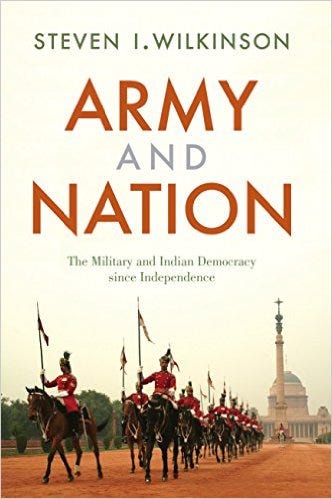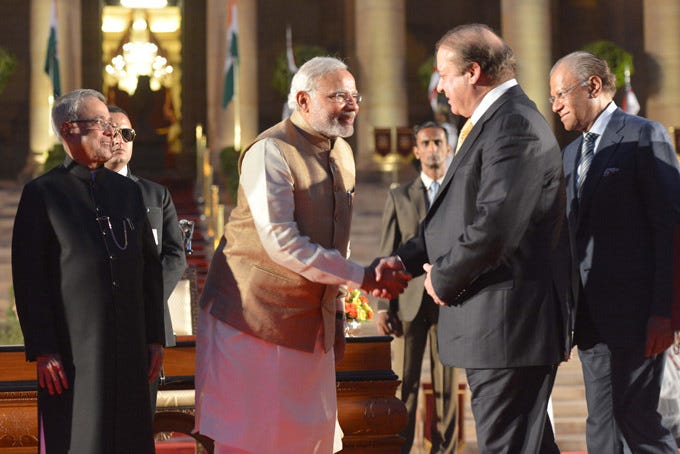Pranay Kotasthane
My contention: the pastime that unites Indians and Pakistanis is not cricket as it is commonly believed to be but a far more interesting game called Clutching at the Straws.
The mechanics of this game are as follows:
gameplay resets/begins when a new person replaces an incumbent one in any of these three positions: the PM of India, the PM of the putative state of Pakistan, or the Chief of Army Staff (COAS) who heads the Pakistani Military—Jihadi Complex (MJC).
You earn straws whenever there’s a statement from the new appointee that can even remotely be construed as a measure to bring down tensions between India and Pakistan. More the media traction this statement gets, more the straws you earn.
You get a leg-up if the new appointee actually translates these initial statements into actions. Common actions are: a photo op between any two leaders in the triad that can be used as a sign of bonhomie, a meeting on the sides of a multilateral summit, or even a bilateral meeting.
Accumulated straws can be lost in two ways: a sudden loss of all straws occurs at the precise moment a terrorist attack emanating from Pakistan takes place on Indian soil. A more gradual dissipation happens if there is no reduction in tensions by the time step 1 is repeated.
Back to step 1.
Funnily enough, though multiple rounds of Clutching at the Straws have been played, gameplay has been such that step 4 dominates and the players are always left with no straws at the end of a round, leaving them hungry enough to clutch more of them in the next round.
The latest round of Clutching at the Straws began with the appointment of Gen. Qamar Bajwa as the sixteenth COAS, as follows: The Nation, as if recovering from a bout of memory loss on Feb 13th 2017, chose to recallBajwa’s first speech as COAS, delivered to senior officers in December 2016. It said:
The general delivered his first speech — an articulation of his vision — as the new army chief in a poised manner and communicated it to his officers in unequivocal terms. The army has no business trying to run the government, the general said. The army must remain within its constitutionally defined role, he stressed. Gen Bajwa also alluded that an impression of a competition between the civilians and the military is counter-productive for the country. And, apart from other professional advice, he urged officers to read a book “Army and Nation”, written by Steven I Wilkinson. [The Nation, 13 Feb 2017]
 Cover image of ‘Army and Nation’. If nothing else, I hope Bajwa’s statement would have shot the sales of this excellent book through the roof.
Cover image of ‘Army and Nation’. If nothing else, I hope Bajwa’s statement would have shot the sales of this excellent book through the roof.
This one report—never mind that it found no mention in any other Pakistani newspaper — was enough to initiate another round of Clutching the Straws. Indian media outlets got into a tizzy over the report implying that Bajwa was different from his predecessors—he is the right person to restructure the civil-military relationship in Pakistan, and steer the relationship with India in the right direction.
My cynical viewpoint is for two reasons. The first one is that we saw exactly the same kind of reportage when Raheel Sharif took oath, and perhaps on many previous instances of change in leadership as well. When he took charge, Raheel Sharif’s speech prioritising internal terrorism as against the external Indian threat was taken as a sign of hope—he would work on ending the hostilities with India and the situation will change for the better, we were told. Well, we know how that turned out.
Second, Gen. Bajwa’s point of view has little bearing on the working of the Military—Jihadi Complex (MJC). May be Gen. Bajwa is the great man he is projected as, may be not. Regardless of what he says or does on this matter, the MJC will strike back, regressing to the mean in quick time. Unless this complex is brought down, it is unlikely that a well-meaning COAS will be able to change the shared culture, of which antagonism towards India and subjugation of the putative civilian leadership are core features. It is highly unlikely that such a fundamental change can be brought about by an endogenous force alone.
Until the MJC is brought down, Clutching the Straws will continue to be a popular pastime. And if books are your thing, I will take Gen. Bajwa’s cue and recommend revisiting Hussain Haqqani’s masterpiece Pakistan: Between Mosque and Military.

No comments:
Post a Comment